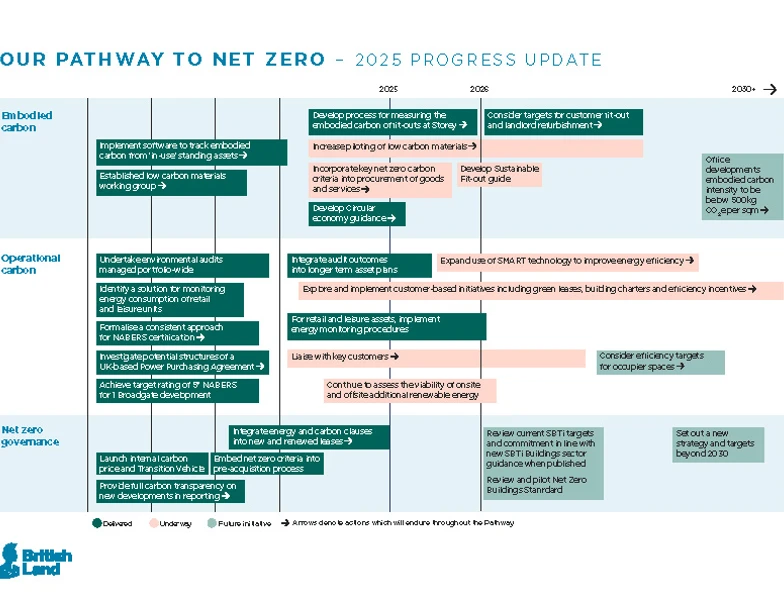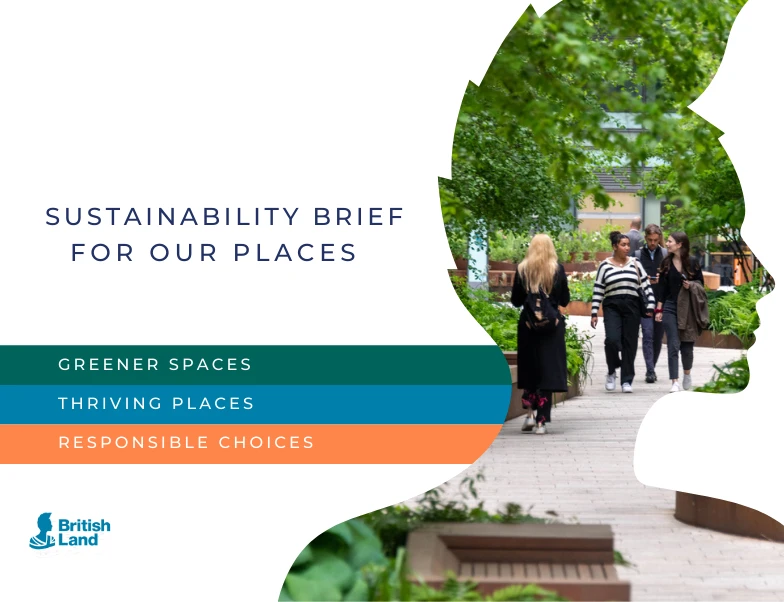We’re making strong progress in enhancing the energy efficiency of our standing portfolio, with 68% now rated EPC A or B. This is up from 58% at FY24.
Our well-established efficiency programme not only advances progress towards our decarbonisation targets, but also futureproofs our portfolio, better positioning it for both the growing demand for more sustainable space and increasingly progressive climate regulations.
The Minimum Energy Efficiency Standards (MEES) have made it illegal to lease or renew leases for properties with EPC ratings below E since 2018 with few exceptions. In April 2023, requirements expanded to include all commercial leased properties, not just new leases and renewals. Additional changes are also proposed to strengthen MEES on a phased basis to 2030, with requirements projected to rise to EPC C or above from 2027 and to EPC B or above from 2030.
We support the strengthening of MEES requirements and, together with the industry, provided detailed feedback on proposed changes. We have significant expertise and experience in upgrading energy performance, which positions us well as the market evolves.
Minimum Energy Efficiency Standards
Update on EPC Progress 1

1 Portfolio data is based on estimated rental value (ERV). Data includes Retail assets located in Scotland which are not subject to MEES regulation.
Key Downloads
Sustainability ReportingUpgrading energy performance
Following a programme of environmental audits, a decarbonisation pathway has been established for nearly all our managed assets which are a fundamental part of their business plans. The estimated cost of these decarbonisation pathways is £100m and we expect that a significant part of this cost will be recovered through the service charge as part of standard lifecycle replacement.
These pathways align with the proposed Minimum Energy Efficiency Standard (MEES) requirements for all non-domestic buildings, where we are targeting buildings to be either EPC A or B rated by 2030. The proportion of the portfolio rated EPC A or B by ERV is now 68%, up from 58% in FY24.
To date, £26m has been spent on carbon efficient interventions across our managed assets. This includes capital expenditure, monies recoverable through service charge and occupier spend in demised spaces.
Interventions identified through environmental audits of individual buildings include retrofitting air or water source heating and cooling pumps, installing the latest LED lighting and introducing CO2 controls. These interventions will accelerate decarbonisation and, at the same time, drive EPC improvements. We are now working with customers to plan these interventions, producing detailed designs and incorporating them into business plans, to move assets out of risk before regulations come into effect.
Interventions will be scheduled to coincide with lease events and planned plant replacement cycles where possible, to minimise disruption to occupiers and avoid unnecessary costs and embodied emissions resulting from replacing equipment before its end of life.
Preparing for MEES
Alongside environmental audits, other workstreams to prepare for MEES include:
- All new developments working towards EPC A, as set out in our Sustainability Brief.
- Revising lease clauses to reflect the new MEES trajectory to ensure that customer fitouts do not negatively impact EPC ratings.
- Resurveying older EPCs, where efficiency improvements have been implemented, to move out of risk now.
- Applying for exemptions where it is not commercially or physically viable to improve EPCs to MEES requirements.
We will maintain our focus on improving actual energy efficiency, which is not always reflected in EPC modelling. In addition, we will continue to be mindful of whole life carbon, recognising that it is not always environmentally positive to replace a major plant, as the embodied carbon footprint can be greater than the operational efficiency savings.







